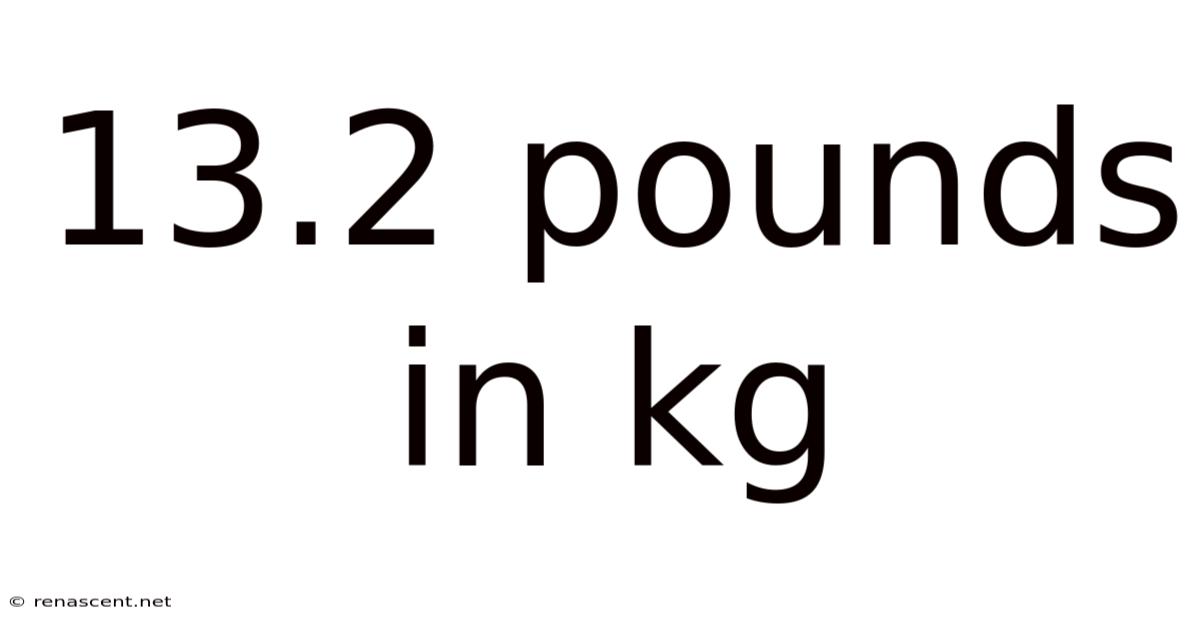13.2 Pounds In Kg
renascent
Sep 19, 2025 · 4 min read

Table of Contents
Decoding 13.2 Pounds: A Comprehensive Guide to Weight Conversion and Understanding the Metric System
Have you ever wondered how much 13.2 pounds is in kilograms? This seemingly simple question opens a door to a broader understanding of weight measurement systems, their history, and their practical applications. This comprehensive guide will not only provide you with the precise conversion of 13.2 pounds to kilograms but also delve into the intricacies of the imperial and metric systems, exploring their differences, advantages, and common uses. We'll also tackle frequently asked questions and offer practical tips for future conversions.
Introduction: The Imperial vs. Metric Systems
Understanding weight conversions requires grasping the fundamental differences between the imperial and metric systems. The imperial system, predominantly used in the United States, utilizes units like pounds, ounces, and tons. Its origins lie in ancient practices and lack a consistent, logical base. In contrast, the metric system, based on the decimal system, employs units like kilograms, grams, and tonnes. It's a coherent and globally standardized system, making conversions much simpler and less prone to errors. This article focuses on converting from the imperial pound to the metric kilogram, a conversion crucial for international trade, scientific research, and everyday applications.
Converting 13.2 Pounds to Kilograms: The Calculation
The conversion factor between pounds (lbs) and kilograms (kg) is approximately 0.453592. Therefore, to convert 13.2 pounds to kilograms, we perform the following calculation:
13.2 lbs * 0.453592 kg/lbs ≈ 5.987 kg
Therefore, 13.2 pounds is approximately equal to 5.987 kilograms. While this is a precise conversion, for many practical purposes, rounding to 6 kilograms is perfectly acceptable. The choice of precision depends on the context; scientific applications typically require higher precision than everyday situations.
A Deeper Dive into the Units: Pounds and Kilograms
Let's delve deeper into the individual units involved in our conversion:
-
Pounds (lbs): The pound is a unit of mass in the imperial system. Its origins trace back to ancient Roman units of weight. Over time, variations in the definition of a pound existed across different regions and periods. Today, the international avoirdupois pound is defined as precisely 0.45359237 kilograms.
-
Kilograms (kg): The kilogram is the base unit of mass in the International System of Units (SI), the modern metric system. It was originally defined as the mass of one litre of water at its maximum density (4°C). However, the definition has since been refined, based on the Planck constant, ensuring a consistent and stable standard globally.
Practical Applications of Weight Conversion
The ability to accurately convert between pounds and kilograms is essential in various fields:
-
International Trade: Global trade necessitates consistent weight measurements. Converting between pounds and kilograms ensures accurate pricing, shipping, and inventory management.
-
Scientific Research: Scientific research often involves comparing data from different sources using various measurement systems. Accurate conversions are paramount for consistency and reproducibility of results.
-
Healthcare: Doctors and healthcare professionals often need to convert weight measurements between pounds and kilograms, particularly when dealing with international patients or referencing international medical literature.
-
Food and Beverage Industry: Recipe conversions, ingredient labeling, and packaging requirements necessitate accurate weight conversions between the imperial and metric systems.
Beyond the Conversion: Understanding the Metric System
While converting 13.2 pounds to kilograms is useful, understanding the broader context of the metric system is crucial. The metric system's elegance lies in its decimal base. All units are related by powers of 10, simplifying calculations and conversions significantly. This contrasts with the imperial system, where conversions often involve awkward fractions and multipliers. For instance, converting between ounces and pounds requires multiplying by 16, while converting grams to kilograms involves a simple decimal shift. This simplicity fosters greater ease of use and reduces the potential for errors.
Frequently Asked Questions (FAQ)
Here are some commonly asked questions about weight conversion:
-
Q: What is the most accurate conversion factor for pounds to kilograms?
- A: The most accurate conversion factor is 0.45359237 kg/lb. However, for most practical purposes, 0.4536 is sufficiently accurate.
-
Q: Can I use online converters for pounds to kilograms?
- A: Yes, many online converters are available for quick and easy conversions. However, understanding the underlying calculations is beneficial for broader comprehension.
-
Q: Why is the metric system preferred in science and engineering?
- A: The metric system's decimal base and coherent units simplify calculations and reduce errors. Its worldwide standardization ensures consistent results across different research groups and collaborations.
-
Q: Are there other units of weight besides pounds and kilograms?
- A: Yes, many other units exist. In the imperial system, we have ounces, tons (short and long), and stones. In the metric system, we have grams, milligrams, tonnes (metric tons), etc.
Conclusion: Mastering Weight Conversions
Converting 13.2 pounds to kilograms isn't merely a mathematical exercise; it's a gateway to understanding the fundamental principles of measurement systems. By grasping the differences between the imperial and metric systems and understanding the conversion process, you equip yourself with a valuable skill applicable across various fields. While online converters offer convenience, understanding the underlying calculations provides a deeper appreciation for the science behind weight measurement and fosters a more profound understanding of units and conversions. Remember, accurate weight conversions are essential for clarity, consistency, and effective communication in a globalized world.
Latest Posts
Latest Posts
-
2 X 0 4
Sep 19, 2025
-
137 Minutes In Hours
Sep 19, 2025
-
3135 Grams To Pounds
Sep 19, 2025
-
Tropic Of Capricorn Rockhampton
Sep 19, 2025
-
Cutie Mark Crusaders Marks
Sep 19, 2025
Related Post
Thank you for visiting our website which covers about 13.2 Pounds In Kg . We hope the information provided has been useful to you. Feel free to contact us if you have any questions or need further assistance. See you next time and don't miss to bookmark.